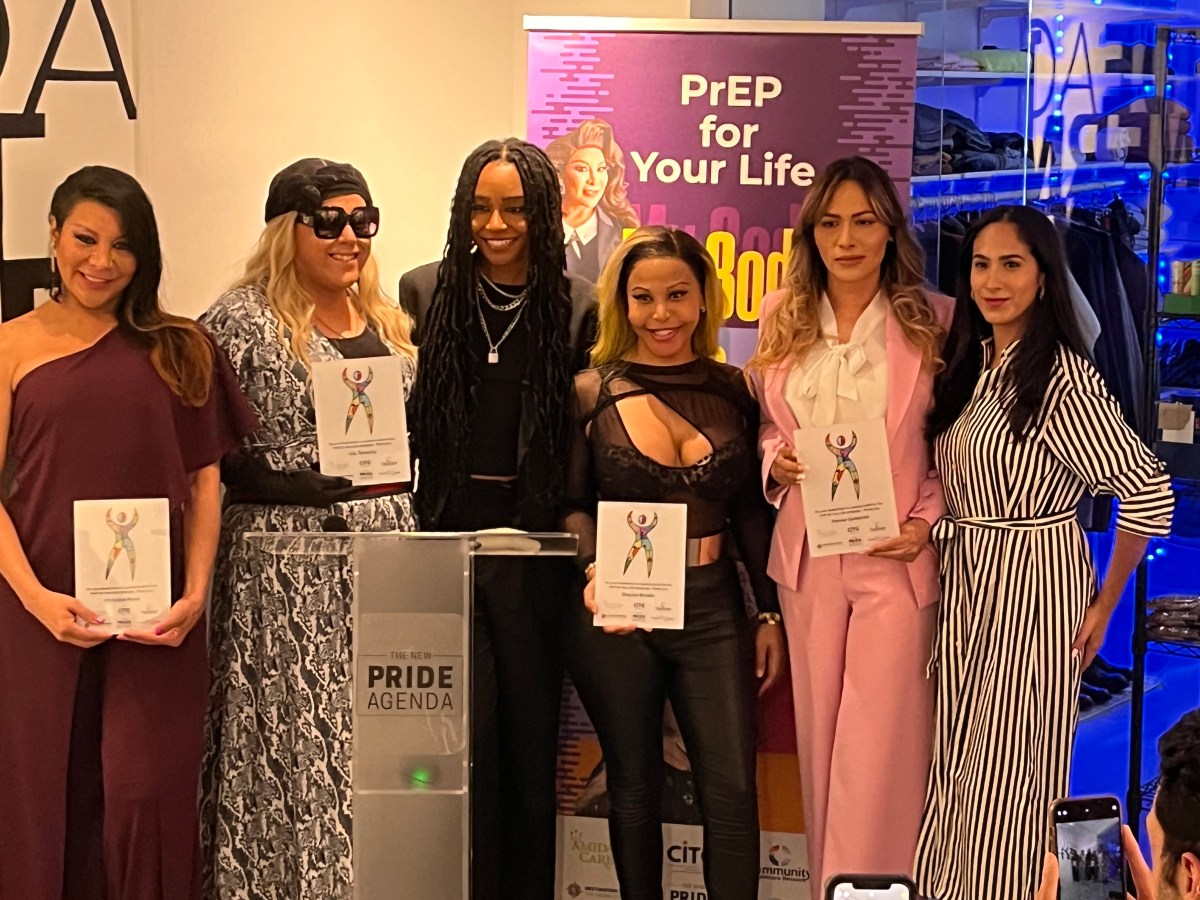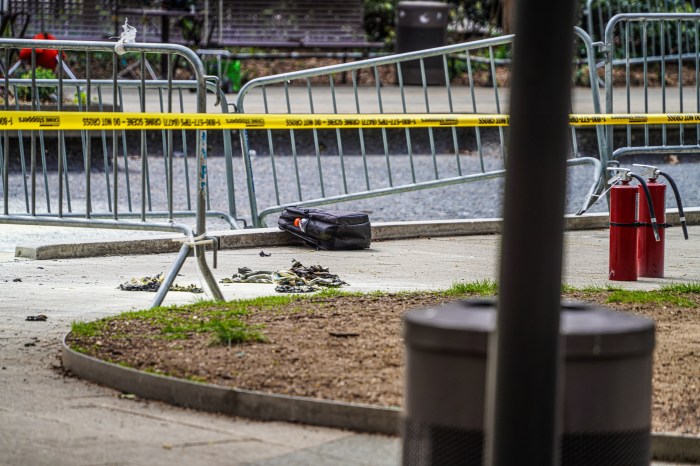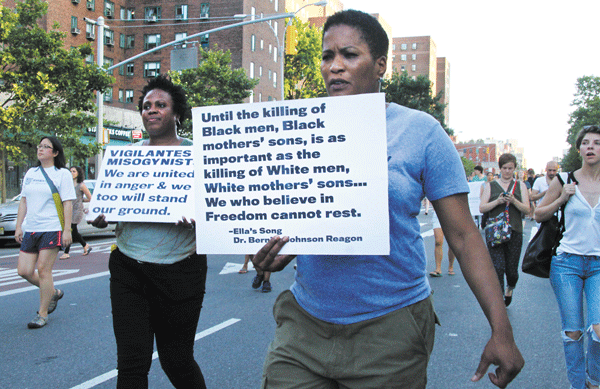
Protesters on Sunday converged at Union Square, then marched up to Times Square.
BY HEATHER DUBIN | Thousands of people converged at Union Square on Sunday evening to voice their outrage over the acquittal of George Zimmerman in the death of Trayvon Martin. The verdict rendered by a six-person jury, all female, in Florida has ignited a national debate about racial profiling, gun control and the legal system.
Demonstrators carried signs that read, “Injustice Anywhere Is a Threat to Justice Everywhere,” “Trayvon Martyr” and “Will I Be Next?” There were several speakers who led the crowd in chants of “Fight The Power,” “For a Revolution” and “Stop and Frisk Is the Crime!”
Kayla Rivera of Brooklyn, 23, held a neon pink sign, “I Am Standing MY Ground / #Justice for Trayvon,” that she hastily made at Duane Reade across the street after coming in from Connecticut. She planned to stand with her sign until her feet were too tired to continue. Rivera expressed her deep disappointment with the verdict.
“It’s extremely unjust,” she said. “I feel as if Trayvon’s family and America as a whole has been let down by the American judicial system.”
Martin, 17, was shot and killed on Feb. 26, 2012, in Sanford by Zimmerman, 29, a neighborhood watch volunteer who thought the teenager wearing a hooded sweatshirt and walking across a lawn at night was up to no good. Last Saturday evening, Zimmerman was found not guilty of second-degree murder and manslaughter. Florida is one of more than 21 states with a “Stand Your Ground” law that allows for self-defense when a person feels threatened by harm or his or her life is endangered.
“I believe that Stand Your Ground law should be taken off the books completely,” Rivera added. “When you stand your ground with a deadly weapon, that’s considered murder.”
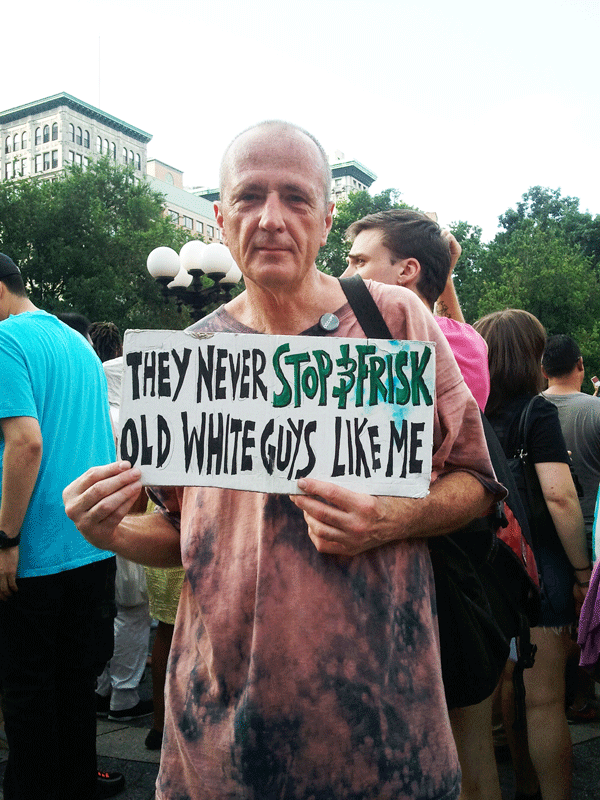
A man noted that he’s not the type who gets racially profiled.
Also in the crowd, Shelia Dartley of Manhattan, 41, said she was “absolutely disgusted” by the verdict. “But I’m not surprised by it,” she said, “especially coming out of Florida because of the way they’ve dealt with minorities in terms of justice.”
While African-Americans comprise 16.6 percent of Florida’s population, they account for 42.5 percent of its jail population, and 28.3 percent of arrests in the state, according to the U.S. Census Bureau.
“We’re beyond disappointed. We don’t even have words at this point,” said Jesse Lang, 31, of the Bronx. Her partner would not give his name, but said he was “an angry black man, 32, with a 13-year-old son.”
“We had to have a talk with him last weekend about being safe,” Lang said of the teen. “We told him to hold his head up high, but be careful — be aware, there are people who are suspicious of him.”
Many protesters wore hooded sweatshirts in solidarity with Martin, despite the heat. Eric Collins of Brooklyn, 39, was one of them, and his hoodie had a thick white lining.
“I’m wearing it because he died,” he said. “I can be uncomfortable for an hour. The least I can do is be here — he’s not.”
Although Collins was not pleased with the verdict, he did advocate for fairness.
“You have to believe in the justice system,” he said. “If you don’t believe in the verdict, you have to believe in the justice system. There’s always going to be someone who doesn’t like the verdict — from gay rights, voting restriction or abortion — there’s always someone who disagrees.”
Collins said the Martin case ruling confirmed to him that black people face a double-standard in terms of how their behavior is perceived.
“My impression is I, as a minority, have to work harder to prove I deserve the rights that are given to other individuals who don’t have to think twice about the rights that have been given to them,” he said.
“I think about this stuff all the time,” he added. “I think twice about any actions that would be deemed as violent. Things can go wrong.”
When he is in front of police officers, he doesn’t put his hands in his pockets, raise his voice or run. He also refrains from making any gestures with his hands, like pointing an index finger, or a violent gesture.
“You have to be submissive to people who are supposed to be protecting you,” Collins said.
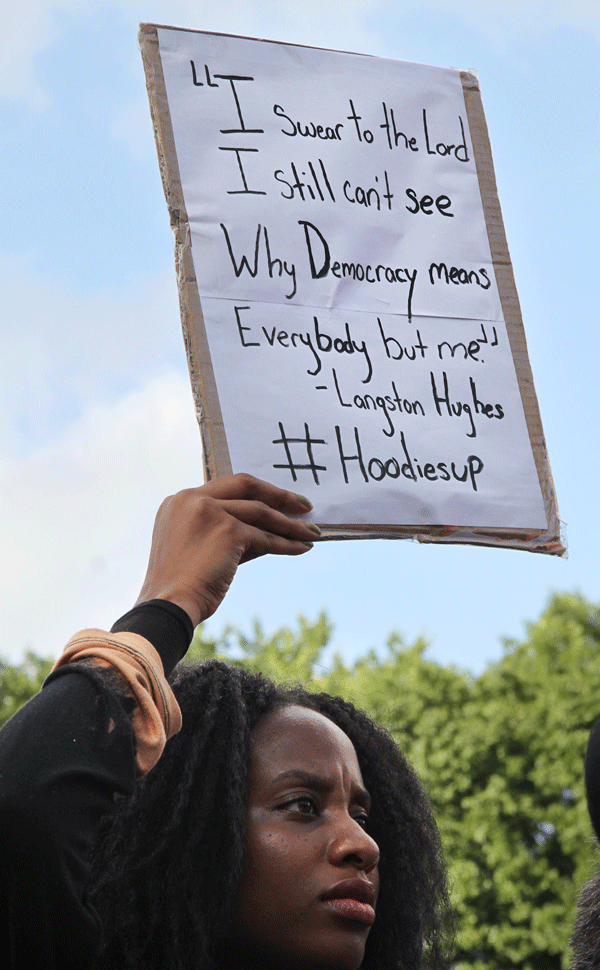
At Sunday’s protest in Union Square, a woman held a sign quoting the great African-American poet Langston Hughes.
He recalled Zimmerman’s claim that Martin’s death was God’s plan, yet his own take has a more hopeful spin.
“Maybe in some twisted way this was supposed to happen, unfortunately,” he said, “because it’s created a movement, and this has caused a chain reaction.”
The protest picked up momentum as demonstrators yelled, “Out of the park and into the streets!” and people pushed through police barriers to pour onto Broadway. Police officers, who had formed a perimeter around the park, did not interfere, and stood in a line to block car traffic on Broadway.
Protesters chanted, “Stand Up! Fight Back!” and a saxophone player and a drummer played “The Battle Hymn of The Republic.” The demonstrators made their way uptown to Times Square, where they continued to protest and shut down traffic once again.
The U.S. Justice Department is currently reviewing the case, and may pursue criminal civil rights charges against Zimmerman. In a statement released Sunday, the department said, “Experienced federal prosecutors will determine whether the evidence reveals a prosecutable violation of any of the limited federal civil rights statues within our jurisdiction, and whether federal prosecution is appropriate in accordance with the department’s policy governing successive federal prosecution following a state trial.”
An investigation was opened last year by the department. D.O.J.’s criminal section of its civil rights division — along with the U.S. Attorney’s Office for the Middle District of Florida and the F.B.I. — is continuing to evaluate the state trial and evidence from the federal investigation.










